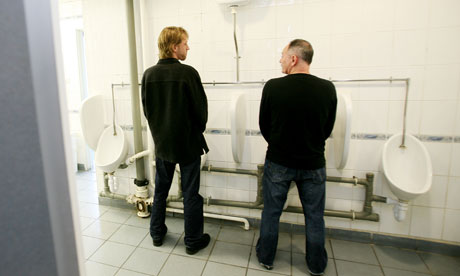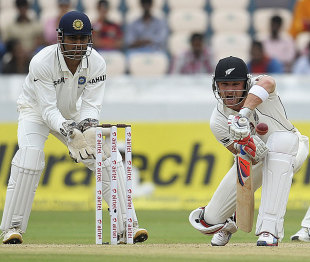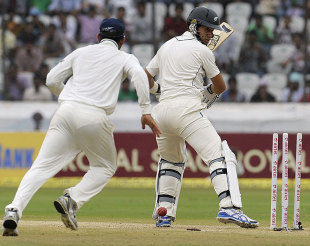Desmond Tutu has helped us see the true nature of what the former prime minister did to Iraq and increased pressure for a prosecution

Tony Blair arrives at the Royal Courts of Justice in London to give evidence on media ethics to the Leveson inquiry in May 2012. Photograph: Dan Kitwood/Getty Images
For years it seems impregnable, then suddenly the citadel collapses. An ideology, a fact, a regime appears fixed, unshakeable, almost geological. Then an inch of mortar falls, and the stonework begins to slide. Something of this kind happened over the weekend.
When Desmond Tutu wrote that Tony Blair should be treading the path to The Hague, he de-normalised what Blair has done. Tutu broke the protocol of power – the implicit accord between those who flit from one grand meeting to another – and named his crime. I expect that Blair will never recover from it.
The offence is known by two names in international law: the crime of aggression and acrime against peace. It is defined by the Nuremberg principles as the "planning, preparation, initiation or waging of a war of aggression". This means a war fought for a purpose other than self-defence: in other words outwith articles 33 and 51 of the UN Charter.
That the invasion of Iraq falls into this category looks indisputable. Blair's cabinet ministers knew it, and told him so. His attorney general warned that there were just three ways in which it could be legally justified: "self-defence, humanitarian intervention, or UN security council authorisation. The first and second could not be the base in this case." Blair tried and failed to obtain the third.
His foreign secretary, Jack Straw, told Blair that for the war to be legal, "i) there must be an armed attack upon a state or such an attack must be imminent; ii) the use of force must be necessary and other means to reverse/avert the attack must be unavailable; iii) the acts in self-defence must be proportionate and strictly confined to the object of stopping the attack." None of these conditions were met. The Cabinet Office told him: "A legal justification for invasion would be needed. Subject to law officers' advice, none currently exists."
Without legal justification, the attack on Iraq was an act of mass murder. It caused the deaths of between 100,000 and a million people, and ranks among the greatest crimes the world has ever seen. That Blair and his ministers still saunter among us, gathering money wherever they go, is a withering indictment of a one-sided system of international justice: a system whose hypocrisies Tutu has exposed.
Blair's diminishing band of apologists cling to two desperate justifications. The first is that the war was automatically authorised by a prior UN resolution, 1441. But when it was discussed in the security council, both the American and British ambassadors insisted that 1441 did not authorise the use of force. The UK representative stated that "there is no 'automaticity' in this resolution. If there is a further Iraqi breach of its disarmament obligations, the matter will return to the council for discussion as required in paragraph 12." Two months later, in January 2003, the attorney general reminded Blair that "resolution 1441 does not authorise the use of military force without a further determination by the security council".
Yet when Blair ran out of options, he and his lieutenants began arguing that 1441 authorised their war. They are still at it: on Sunday, Lord Falconer tried it out on Radio4. Perhaps he had forgotten that it has been thoroughly discredited.
The second justification, attempted again by Blair this weekend, is that there was a moral case for invading Iraq. Yes, there was one. There was also a moral case for not invading Iraq, and this case was stronger.
But a moral case (and who has launched an aggressive war in modern times without claiming to possess one?) does not provide a legal basis. Nor was it the motivation for the attack. In September 2000, before they took office, a project run by future members of the Bush administration – including Dick Cheney, Donald Rumsfeld and Paul Wolfowitz – produced a report which said the following: "While the unresolved conflict with Iraq provides the immediate justification, the need for a substantial American force presence in the Gulf transcends the issue of the regime of Saddam Hussein." Their purpose, they revealed, was "maintaining American military pre-eminence". The motivation for deposing Saddam Hussein was no more moral than the motivation for arming and funding him, two decades before.
But while the case against Blair is strong, the means are weak. Twenty-nine people have been indicted in the international criminal court, and all of them are African. (Suspects in the Balkans have been indicted by a different tribunal). There's a reason for this. Until 2018 at the earliest, the court can prosecute crimes committed during the course of an illegal war, but not the crime of launching that war.
Should we be surprised? Though the Nuremberg tribunal described aggression as "the supreme international crime", several powerful states guiltily resisted its adoption. At length, in 2010, they agreed that the court would have jurisdiction over aggression, but not until 2018 or thereafter. Though the offence has been recognised in international law for 67 years, the international criminal court (unlike the Rwanda and Yugoslavia tribunals, which hear cases from before they were established) will be able to try only crimes of aggression committed beyond that date.
The other possibility is a prosecution in one of the states (there are at least 25) which have incorporated the crime of aggression into their own laws. Perhaps Blair's lawyers are now working through the list and cancelling a few speaking gigs.
That the prospect of prosecution currently looks remote makes it all the more important that the crime is not forgotten. To this end, in 2010 I set up a bounty fund –www.arrestblair.org – to promote peaceful citizens' arrests of the former prime minister. People contribute to the fund, a quarter of which is paid out to anyone who makes an attempt which meets the rules. With our fourth payment last week, we've now disbursed more than £10,000. Our aim is the same as Tutu's: to de-normalise an act of mass murder, to keep it in the public mind and to maintain the pressure for a prosecution.
That looked, until this weekend, like an almost impossible prospect. But when the masonry begins to crack, impossible hopes can become first plausible, then inexorable. Blair will now find himself shut out of places where he was once welcome. One day he may find himself shut in.






